Day 2 (24/6) - Shanghai: Walkabout, Museum, French Concession (Part 1)
Ed: The pictures in this post were restored in late December 2010 after Mediafire deleted my account in 2007. The two post titles are different for historical reasons (I have left the original title in bold while using a more useful one as the bona fide one)
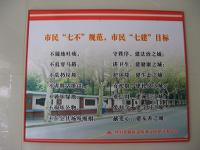
Rough translation:
"Seven don'ts for city residents, and the seven things for them to work towards.
Don't: spit, jaywalk, litter, scold vulgarities or obscenities, despoil the environment, destroy public property [Ed: Since this is a Communist country, technically all property is public] or smoke in public.
Please: observe rules to build a law-abiding city, be hygienic to build a healthy city, care for your environs to build a green city, be polite to build a courteous city, be trustworthy to build a reliable/trustworthy city, love science/knowledge to build a learning city and practise free love to build a city full of fellowship."
I swear, the best thing about being conversant in (a form of) Chinese in China is that you get to read the propaganda posters.
An alternate translation by My Beloved Understudy:
"And from what i gather, the Don'ts:
Anyhow Spit (aim at your target before you spit), Anyhow Dash across the road (Take your time, otherwise will trip and fall), anyhow toss rubbish by the roadside (you can get some small change by selling to karang guni)
It's a literal translation...
more don'ts:
make vulgar or dirty statements
desecrate or damage natural objects (You can blow up man-made ones for all we care)
Damage public property (You can blow up all private property for all we care... wait, there shouldn't be 'private' property... they all belong to us!)
Smoke in public (Use a chimney instead)
and the objectives all citizens should look forward to:
Be vigilant and build a lawful city
Be hygienic and build a healthy city
Protect the environment and build a ?city of conscience?
Be respectful and build a courteous city
Be trustworthy and build a city based on trust (just leave your yuans at the city council)
Love science and build a city of knowledge (Communists really love knowledge, don't believe what you read elsewhere)
Be loving and compassionate and build a city of friends (We'll take care of the backstabbing for you)"
Most stuff in China is incredibly cheap - Made In China stuff is already quite cheap, but *Sold* In China stuff is even cheaper (proof that markets don't clear). For example a bottle of Coke can cost as little as 1.50 Yuan (30 Singapore cents).
Yucheng, Lin brought me for breakfast and the Wo Tie was like Xialongbao, with juice inside. The result being that I scalded myself. Gah.
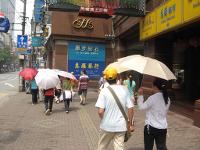
I didn't expect there to be so many umbrellas. The locals are quite nua (there were some males using them also)
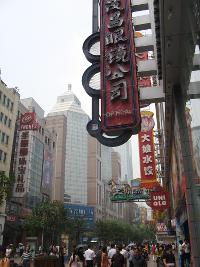
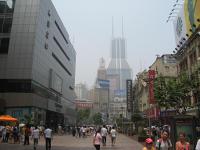
Nanjing Road
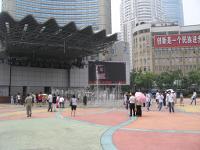
Fountain along Nanjing Road
The screen was showing a video celebrating the demolishing of the slums in preparation for Expo 2010, and showed people being happy at being resettled, pronouncing them happy that their shabby flats were gone. I'm sure no one consulted the resettled people in the making of that video.
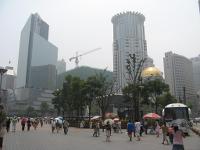
Nanjing Road East
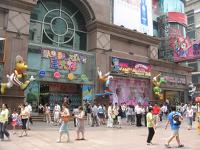
Large kids store

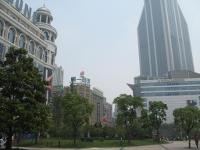
Shanghai No 1 Department Store
Yucheng: "The prices are also Number 1"
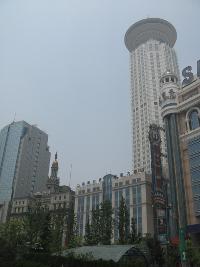
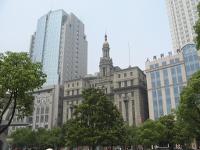
New World
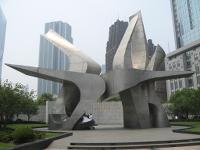
Weird sculpture (IIRC it commemmorates a workers' uprising)
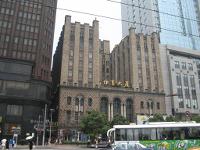
Random building
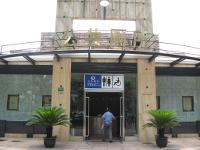
Country Club disguised as a toilet

Church
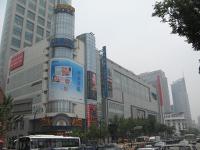
Raffles City (Capitaland)
In Singapore we transliterate it to Chinese as "莱佛士" (lai2 fo2 shi4). There, it became "莱福士" (lai2 fu2 shi4), evoking images of good fortune. Bah.

Man relac one corner-ing
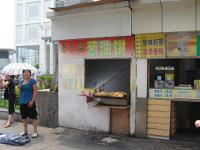
Biscuit stall
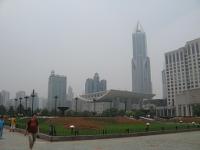

People's Square
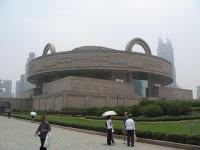
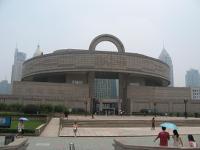
Shanghai Museum, "designed in the shape of an ancient, bronze, tripod cooking vessel called a ding."
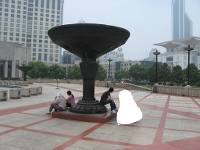
Johnny Malkavian photographing
The girl at the ticket counter refused my NUS card because she said there was no expiry date on it, so I paid 20 yuan instead of 5. Gah.
I used the toilet in the museum and was very pissed off to find many globs of spit on the floor of my cubicle. I don't know what's wrong with these people - the toilet bowl is so near. On the other hand, there wasn't as much spitting in the street as I expected so maybe it was saving up.

Discriminaton against non-Chinese speakers
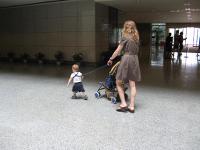
Dog on a leash
Besides the excellent permanent collection (which somehow escaped the Cultural Revolution), there was also an exhibition on "Art in America". Since it was spread out among 4 floors, I viewed American and Chinese art alternately.
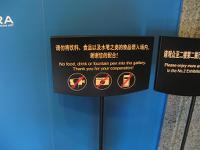
No fountain pens allowed in the American art exhibition. Wth?!
US art cannot make it in general. For example "A peaceable kingdom with Quakers bearing banners" was very uhh. Although many genres were represented (even still life), religious art was notable for its absence - its place was probably replaced by works celebrating the American Mythos.
I saw a woman in a habit on an animal with a man leading her. At first I thought it was the Flight from Egypt, then I saw it was "Daniel Boone escorting settlers through the Cumberland Gap".
Sargent - A Parisian beggar girl, 1880 was blur but I could make out that she was in what looked like a dirty wedding dress, which confused me.
First was the bronzes collection. Many of the best works were probably not in China, but what was on display was already most impressive.
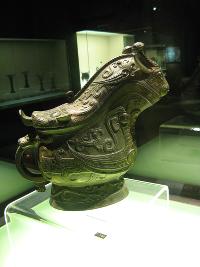
Wine vessel, Late Shang. 13th-11th century BC.
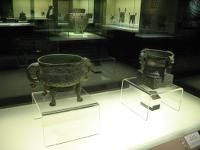
Food vessels. Early W. Zhou. 11th c. BC.
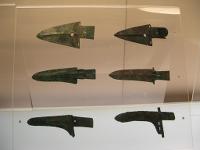
Ges (dagger-axes). Late Shang and Early W. Zhou.

Water vessel of Zi Zhong Jiang. Early Spring & Autumn period. 770-7th c. BC.
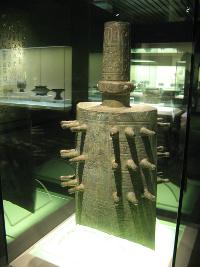
Bell with Dragon design. Late W. Zhou, Early 9th c. BC-771 BC.
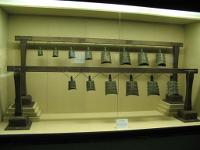
Bells of Marquis Su of Jin. Mid 9th c. BC.
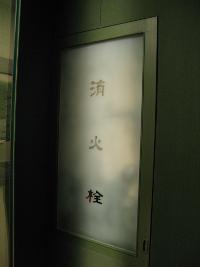
Elegant but stupid fire extinguisher case (only Chinese-speakers would know what was behind)
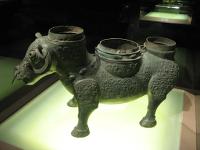
Ox-shaped wine vessel. Early 6th c. - 476 BC.
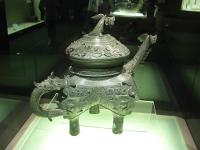
Wine vessel with dragon spout and animal rack. Early 7th - Early 6th c. BC.
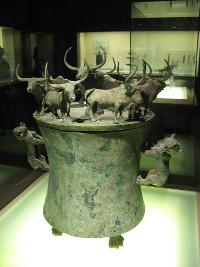
Cowrie container with 8 yaks. W. Han, 208 BC - 8 AD.
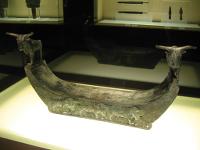
Pillow with 5 Yaks. W, Han. 208 BC - 8 AD.
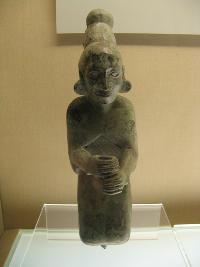
Statue of Lady. W. Han. 208 BC - 8 AD.
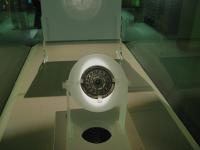
'Transparent' mirror.
They were very proud of it, giving it an extended writeup:
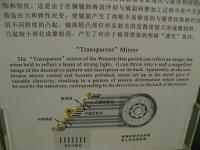
"The 'Transparent' mirror of the Western Han period can reflect an image; but when held to reflect a beam of strong light, it can throw onto a wall a magnifified image of the decorative pattern and inscription on its back. Apparently, as the cast bronze mirror cooled and became polished, stress set up in the metal gave it variable elasticity; resulting in a pattern of minute deformation which cannot be seen by the naked eye, corresponding to the decoration on the back of the mirror."
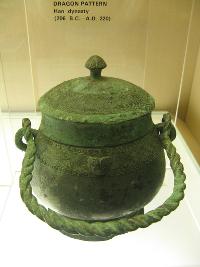
Appendage by burn-out casting. Wine vessel with cord-patterned handle. 13th-11th century.
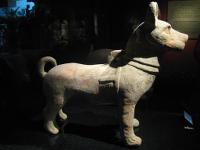
Pottery dog. E. Han, 25 - 220 AD.
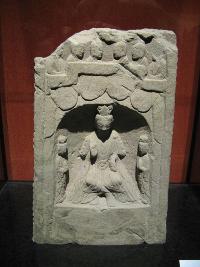
Maitreya Bodhisattva, stone. N. Wei. 386 - 534 AD.
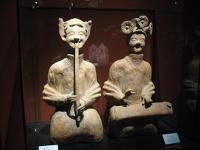
Figure blowing bamboo flute, Figure playing lute. Pottery, E. Han. 25 - 220 AD.
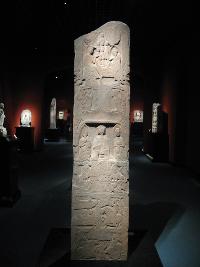
Buddhist stone stele. N. Wei. 386 - 534.
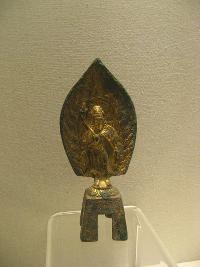
Bodhisattva, gilt bronze. N. Wei. 501 AD.
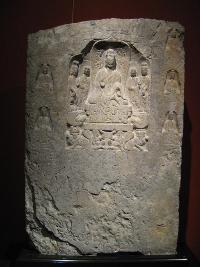
Sakyamuni Buddha stone stele. W. Wei. 540 AD.

Sakyamuni Buddha gold-painted stone. 546 AD. Liang.
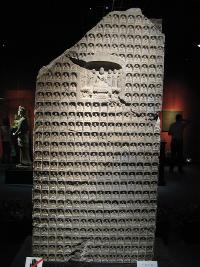
1000 buddha stone stele. N. Zhou. 557 - 81 AD.
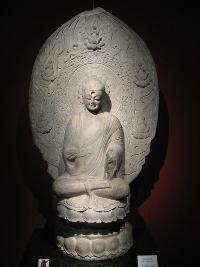
Sakyamuni stone Buddha. N. Qi. 550 - 77 AD.
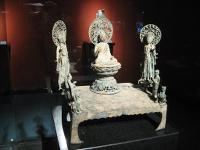
3 Amitabha bronze Buddhas. Sui. 581 - 618 AD.
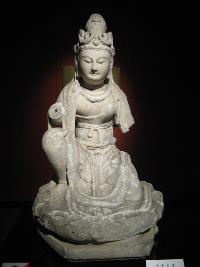
Stone Bodhisattva. Tang. 618 - 907.
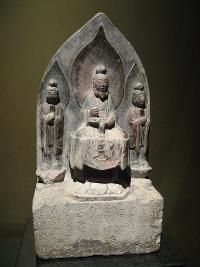
Lao Jun. Stone. Tang. 740 AD.
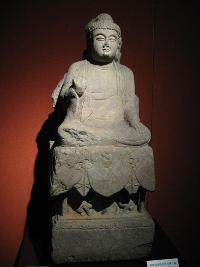
Stone amitabha Buddha. Tang. 723 AD.
Johnny Malkavian on photoshopping a finger onto this: 'If we do that, between the 2 of us we [will] have 3 of the world's largest religions coming after us'
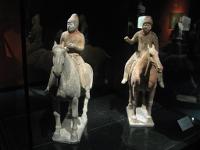
Equestrian, Coloured pottery. Tang. 618 - 907 AD.
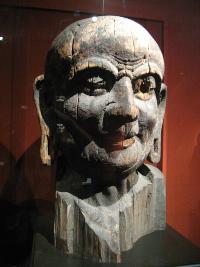
Head of Kasyapa. Wood. Tang. 618 - 907 AD.
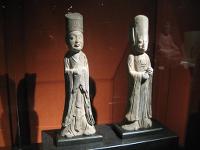
Civil official, maid servant. Pottery. S. Tang, 943 AD.
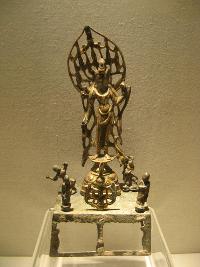
Bodhisattva, gilt bronze. Tang. 618 - 907 AD.
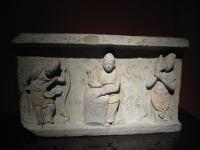
Stone musicians. 5 dynasties. 907-60 AD.
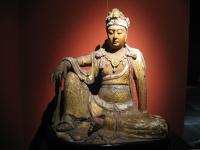
Bodhisattva, painted and gilded wood. Song. 960-1279 AD.
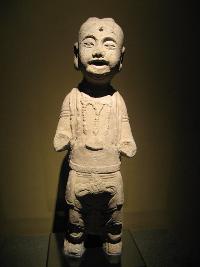
Stone prince. Song. 960-1279 AD.
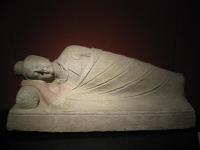
Stone reclining Buddha. Song. 960-1279 AD.
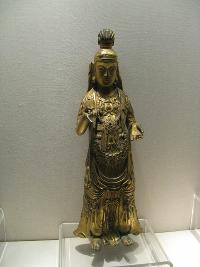
Gilt bronze Bodhisattva. Liao. 916-1125 AD.
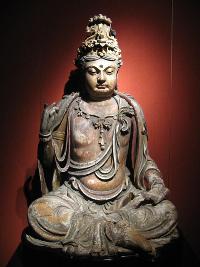
Bodhisattva, gold painted wood. Jin. 1115-1234 AD.

Stone lokapala. 960-1279 AD.
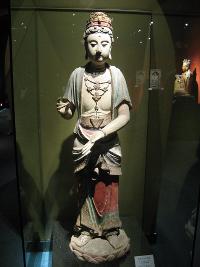
Painted clay Bodhisattva. Song. 960-1279 AD.
I then went back to American art. I saw what was probably my first Jackson Pollock (No. 18, 1950), and it was hideous. This was probably why fountain pens were disallowed - to prevent pissed off people from vandalising the crap they had.
"Grrrrrrrrrrr!!", 1960 by Roy Lichtenstein looked familiar. I'd seen some of his works in Stanford.


